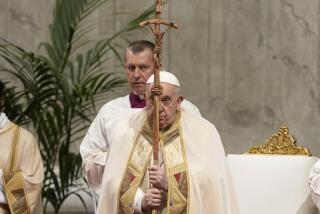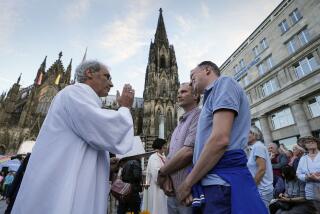NEWS ANALYSIS : Accord Viewed as a Bridge to Understanding
- Share via
Despite the historic accord to forge diplomatic relations between the Vatican and Israel, ignorance and painful misunderstandings remain between Christians and Jews.
Now, leading Jewish and Roman Catholic scholars and clergy are looking to the next step: building understanding between two traditions that have so much in common and so much in dispute.
While Jewish leaders say that blatant anti-Semitism among Catholics in the United States is rare, Catholics and Christians in general are unaware of Judaism’s history and traditions--and the importance of Israel in Jewish thinking.
Many Catholics, and Christians generally, still view Jews as “potential Christians,” wrote Father Thomas Stransky, an early staff member of the Vatican’s Secretariat for Promoting Christian Unity, in 1985.
By the same token, while many Jews are vaguely aware that the Roman Catholic Church in 1965 absolved Jews of blame for the crucifixion of Jesus, they are less knowledgeable about other strides taken by the church in the last generation. Those include statements of repentance for anti-Semitism and the declaration that Jews “still remain most dear to God.”
Some Jews, still shaken by the brutality of the Holocaust, may be wary of overtures from any source and are skeptical of the latest breakthrough between the Vatican and Israel.
Others wonder why it took so long.
“There has been a painful ignorance in the two communities of each other for centuries,” said Eugene Fisher of the U.S. Conference of Catholic Bishops’ Secretariat for Ecumenical and Inter-Religious Affairs.
Rabbi Jack Bemporad, director of the Center for Christian-Jewish Understanding at Sacred Heart University in Fairfield, Conn., said the time has come for deeper understanding.
“We need to get beyond a state of tolerance and genuine goodwill to real understanding,” Bemporad said.
No one expects that Catholics and Jews will reach a common understanding on the great theological issues that divide them, among these the nature of salvation, the interpretation of the Hebrew Scriptures and the nature of Jesus.
“I think that theologically, the (religious views) are insurmountable,” said Rabbi Gary Greenebaum, the western regional director of the American Jewish Committee in Los Angeles.
But Greenebaum and others said that should not deter new efforts at understanding.
A beginning, they said, is to learn how Catholic-Jewish relations have been transformed over the last generation, particularly during the pontificate of John Paul II.
Despite Jews’ anger over John Paul’s meetings with Palestine Liberation Organization leader Yasser Arafat and Austrian President Kurt Waldheim, who was accused of involvement in Nazi war crimes, Bemporad said John Paul has transformed the church’s view of Jews and of Israel.
“He was the first Pope to ever walk into a synagogue (since the Apostle Peter). He was the first Pope to ask forgiveness of all sins committed against the Jewish people, and the first Pope to establish diplomatic relations with Israel,” Bemporad said.
Bemporad and Fisher said that Jews and Catholics must move beyond the “old questions of anti-Semitism and Israel” and turn to theological understandings of each other’s faiths.
Christian and Jewish scholars agree that Christians need to become acquainted with the Jewishness of Jesus and the early church, while Jews need to better understand the person of Jesus in the historical context of his times.
In Los Angeles, relations between Jewish and Catholic religious leaders have been particularly close.
Rabbi Lennard R. Thal, regional director of the Union of American Hebrew Congregations, and Rabbi Harvey J. Fields, for example, have worked closely with Cardinal Roger M. Mahony, the Roman Catholic archbishop of Los Angeles, on issues from joblessness to gang violence.
Thal said he expects joint programs to help each group better understand the importance of the other’s holy sites.
And Catholics and Jews have often found themselves aligned on major social issues, Fisher said.
“It’s a shame,” Thal said, “that so little inter-religious dialogue occurs, not because it will change anyone’s life but because it not only allows people to understand the faith of their neighbors but very often motivates them to become more deeply immersed in the study of their own.”
More to Read
Sign up for Essential California
The most important California stories and recommendations in your inbox every morning.
You may occasionally receive promotional content from the Los Angeles Times.













